Stress and anxiety can sneak into your life, affecting your health. It’s key to manage these feelings to stay balanced. Simple, natural methods can ease stress and anxiety, helping you face daily challenges.
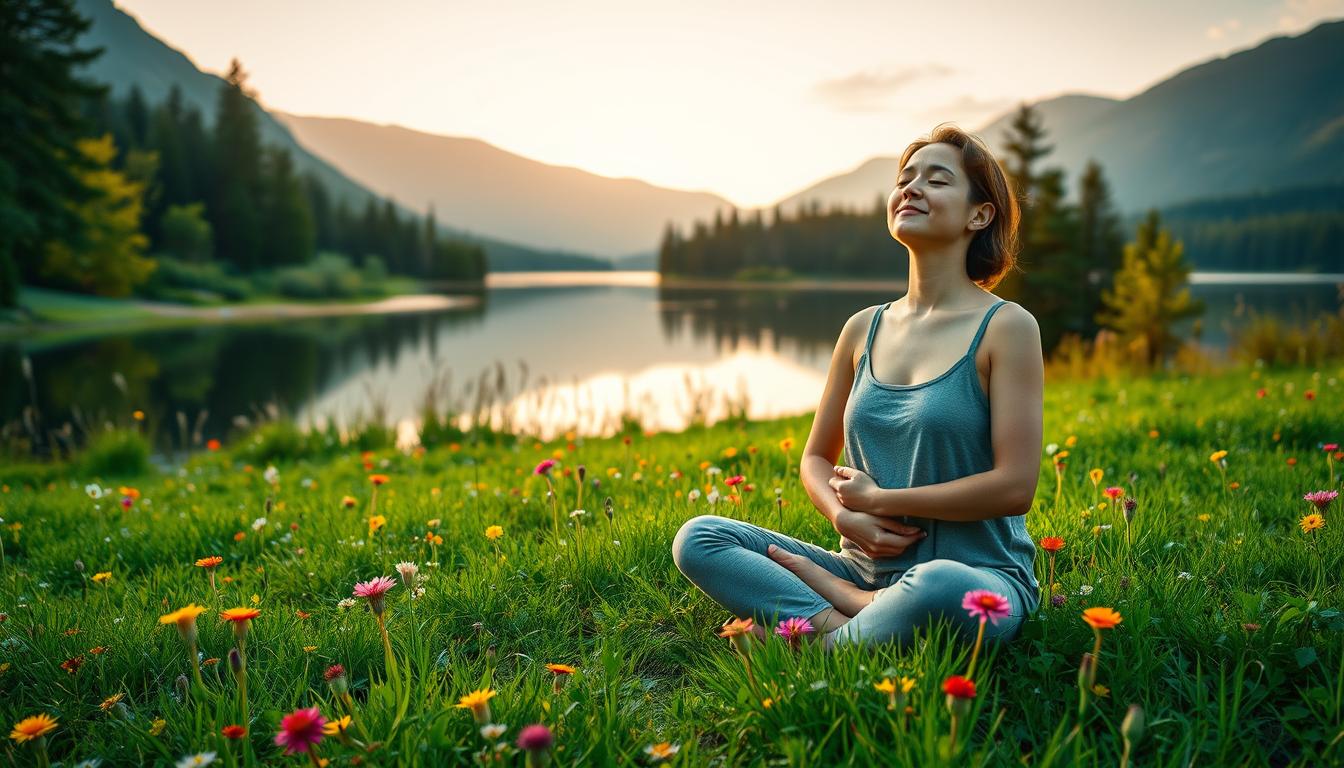
You don’t need big changes or complex routines to feel better. Small habits, like deep breathing or stepping outside, can calm you down. By adding these easy and effective stress relief tips to your day, you can feel more grounded and in control.
Key Takeaways
Simple habits can help reduce daily stress and anxiety.
Spending time in nature and practicing deep breathing are simple yet powerful ways to ease stress. Small daily adjustments to your routine can boost your overall health and happiness.
Natural stress relief methods can be easy to implement.
Daily anxiety relief is achievable with the right techniques.
Understanding the Impact of Stress and Anxiety on Daily Life
It’s important to know how stress and anxiety affect us.These habits can impact multiple areas of our lives, including our physical condition and our mental and emotional states.
How Stress Affects Your Physical Well-being
Stress can harm our physical health. It can cause headaches, tiredness, and stomach problems. Long-term stress can lead to serious issues like high blood pressure and a weak immune system.
By understanding how stress affects us, we can take steps to stay healthy.
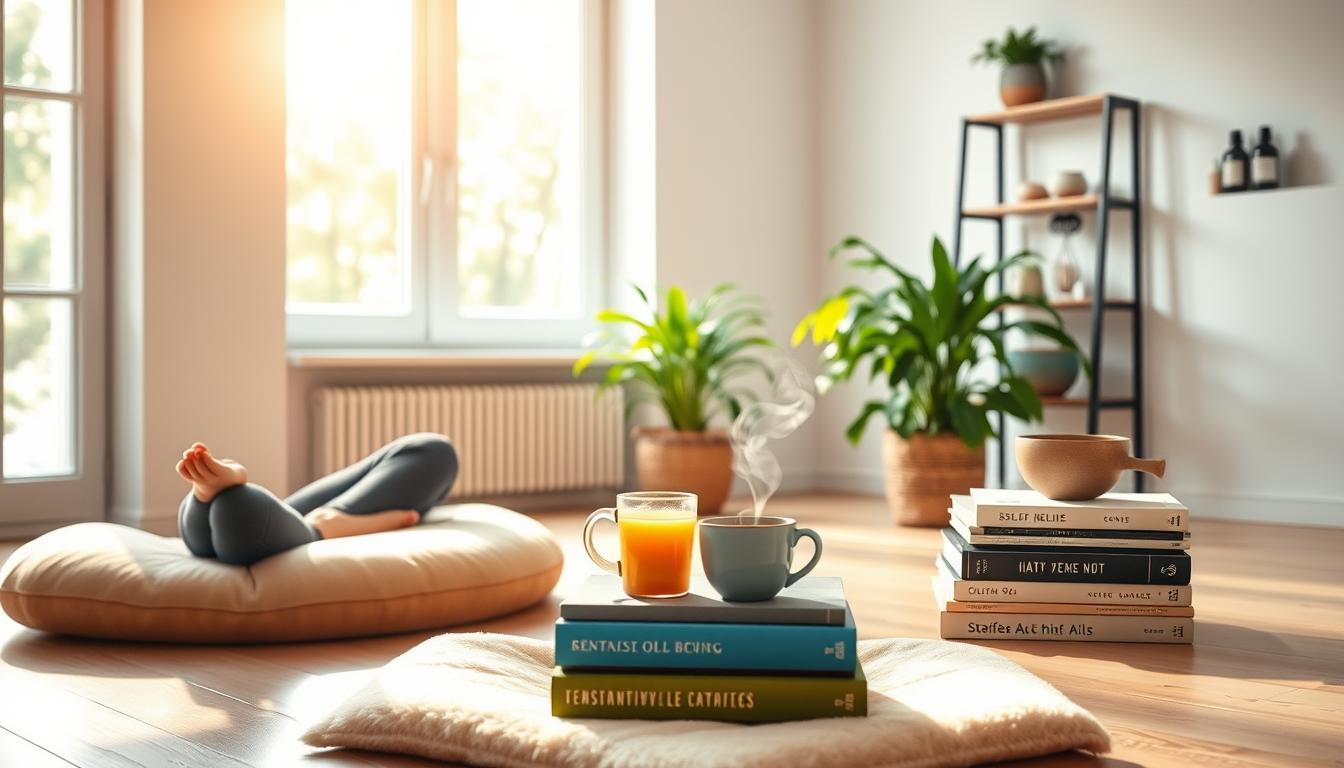
The Mental and Emotional Toll of Anxiety
Anxiety can really hurt our mental and emotional health. It can make us feel overwhelmed, irritable, and even lead to anxiety disorders. It can also make it hard to focus, make decisions, and keep good relationships.
Recognizing the signs of anxiety is the first step to finding relief. It helps us regain emotional balance.
By understanding the effects of stress and anxiety, we can start looking for stress relief tips and daily anxiety relief strategies. This knowledge is crucial for improving our emotional well-being and finding effective stress reduction strategies.
Effective Ways to Find Mild Relief from Stress and Anxiety
Stress and anxiety relief is easier when you know the right techniques. Start by making small changes to your daily routine. Add practices that help you relax and feel calm.
Breathing Techniques for Immediate Calm
Breathing exercises for anxiety are simple yet effective. Try diaphragmatic breathing, or belly breathing. It helps lower your heart rate and brings a sense of calm to your body.
To do it, sit straight, put one hand on your belly, and the other on your chest. Take a deep breath through your nose, allowing your stomach to expand while keeping your chest steady.
Regularly practicing these breathing techniques can greatly reduce stress. You can also try 4-7-8 breathing. Inhale slowly for a count of four, hold your breath for seven seconds, then exhale gently for eight counts.
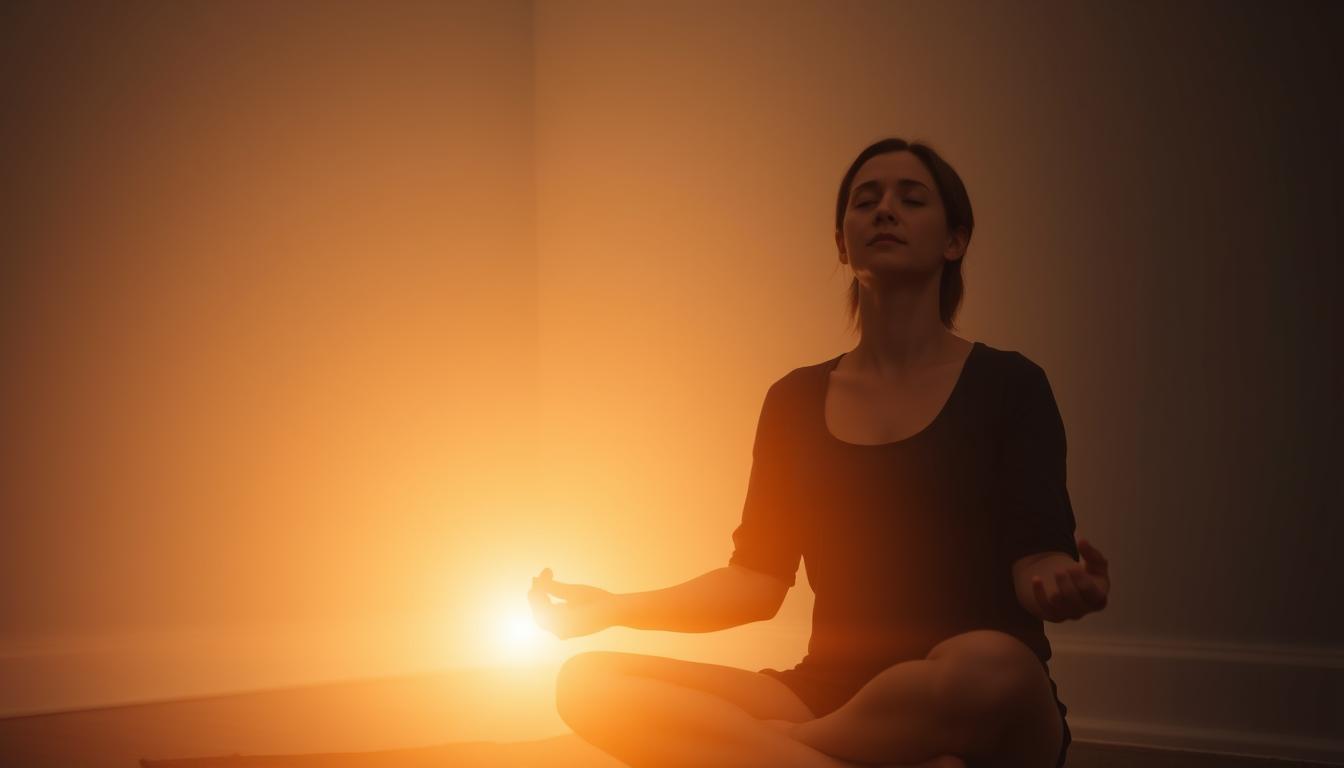
The Power of Light Movement and Physical Activity
Light movement for stress relief is also effective. Activities like yoga, tai chi, or a short walk release endorphins. These mood-boosting chemicals don’t require intense or long workouts.
For example, gentle stretches or a short walk in the morning can set a positive tone. It helps you feel more centered.
Nature-Based Solutions for Stress Relief
Spending time in nature is a great way to find natural stress and anxiety relief. Being outdoors, whether walking in a park or gardening, calms you. Nature grounds us and reduces overwhelm.
Try to add calming daily habits that involve nature. Take a short walk during your lunch break or spend time with your plants each day.
Staying Hydrated and Nourished for Emotional Balance
Emotional balance also depends on physical needs like hydration and nutrition. Drinking enough water is key, as dehydration can worsen anxiety. Eating a balanced diet with fruits, vegetables, whole grains, and lean proteins stabilizes your mood.
By adding these calming daily habits to your routine, you can better manage stress and anxiety. These practices contribute to a more harmonious and centered lifestyle.
Creating Daily Mindfulness Practices for Emotional Balance
Adding mindfulness to your daily routine can change how you handle stress and anxiety. Just a few minutes each day can bring calm and clarity to your life.
Mindfulness involves staying present and observing your thoughts and emotions without criticism. It helps you understand yourself better, making it easier to handle tough situations.
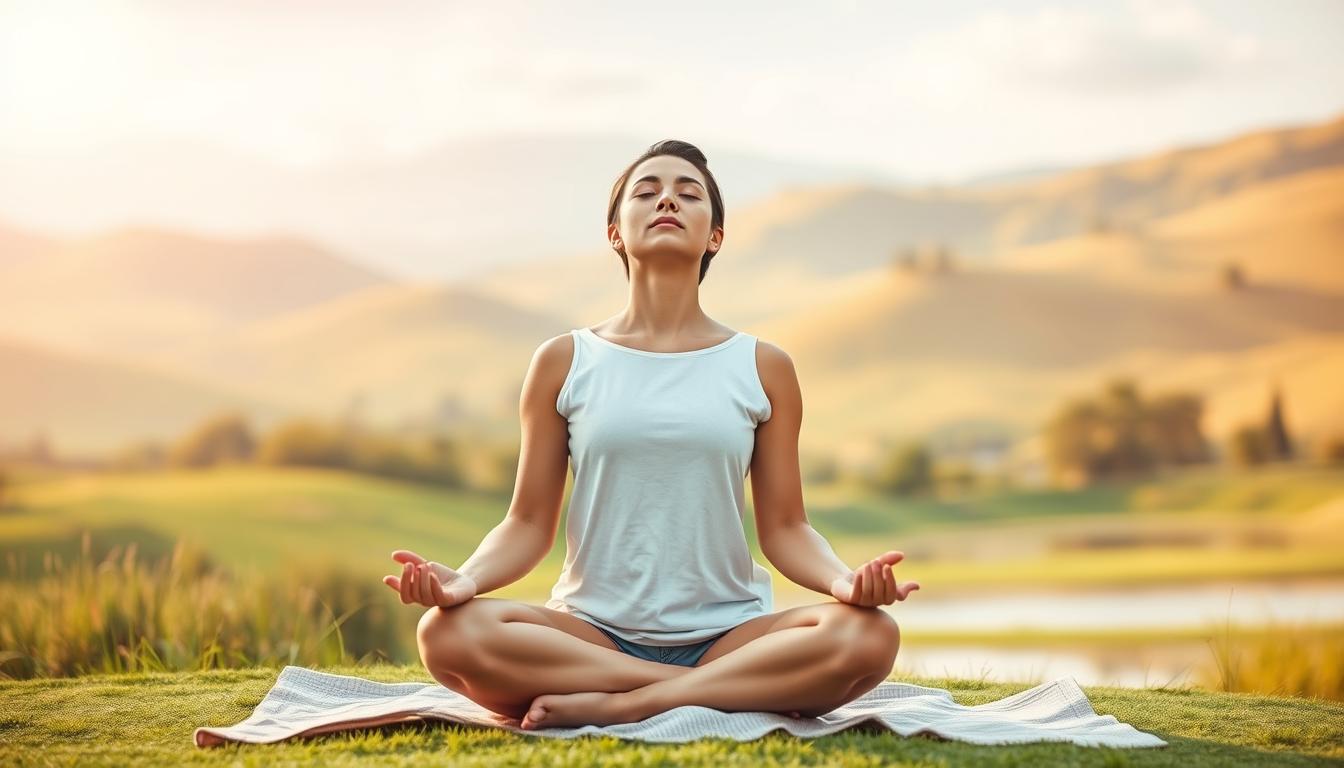
Simple Meditation Techniques for Beginners
Meditation is a great mindfulness practice for beginners. Begin with brief sessions lasting a few minutes. Pay attention to your breathing, sensing the airflow through your nose. Focus on your breath, feeling the air move in and out of your nose. If your mind drifts, gently bring it back to your breath without judging yourself.
Guided meditation apps can also help. They offer a soothing voice to guide you. Regular meditation can make you more present and calm, helping to reduce anxiety.
Journaling as a Tool for Processing Anxiety
Keeping a journal is an effective mindfulness tool for managing anxiety. Putting your thoughts and emotions into words can bring clarity and reveal stress triggers.
Try to write for a few minutes daily—whether it’s about your feelings, your daily experiences, or what you’re grateful for. This simple habit can reduce tension and offer fresh insight.
Practicing Gratitude and Staying Present
Practicing gratitude is a mindfulness technique that focuses on what you’re thankful for. Take a moment each day to think about the good things in your life, no matter how small. Practicing this regularly can boost your mood and ease feelings of anxiety.
It’s also important to stay present to manage anxiety. Direct your attention to the present moment instead of dwelling on what’s ahead or behind you. Mindfulness practices like deep breathing, meditation, and journaling can help you stay in the present.
Designing a Stress-Reducing Home Environment and Routine
Turning your home into a calm place can help manage stress and anxiety. Adding calming elements and soothing routines can make your living space peaceful. This promotes emotional balance and well-being.
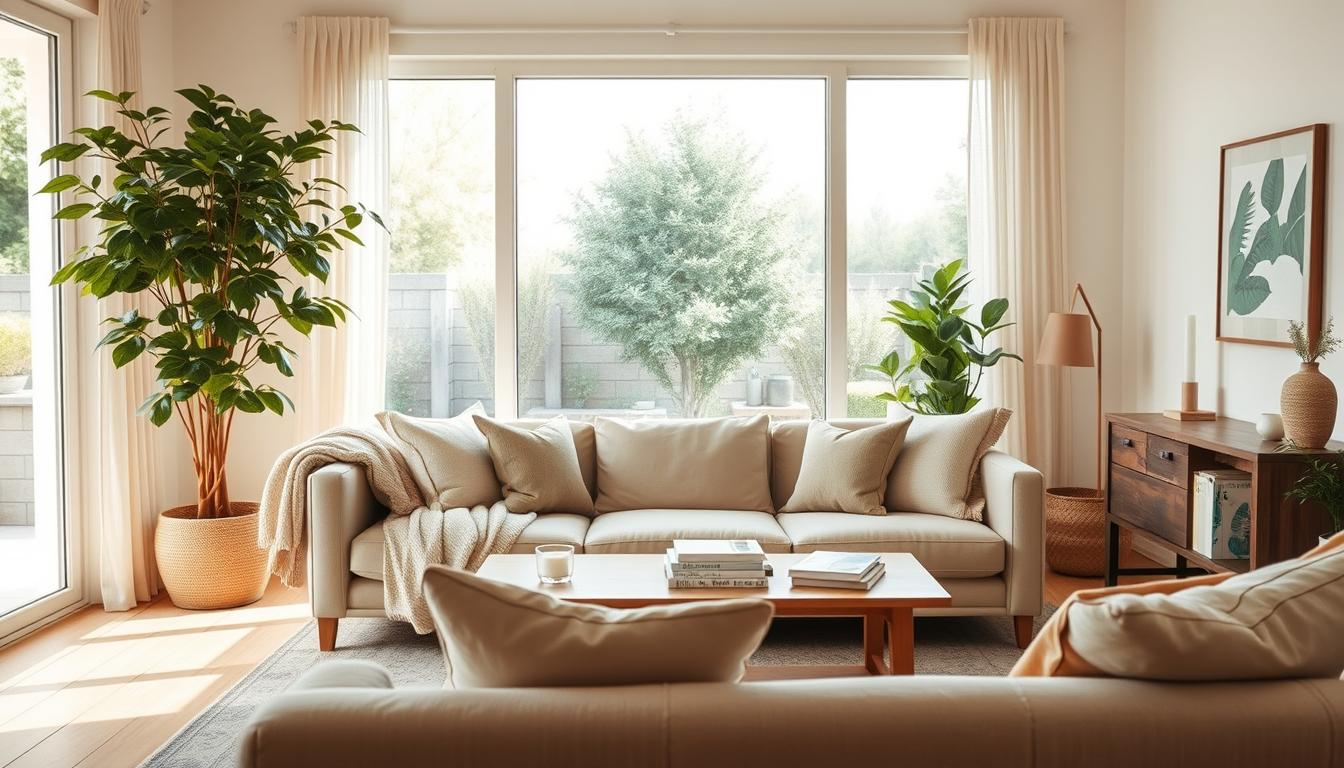
Calming Sensory Elements: Light, Sound, and Scent
Consider how sensory elements affect your mood and stress. Soft, warm lighting from table lamps or string lights can calm you. Sound machines or nature sounds can also help mask noise. Aromas such as lavender or vanilla can help create a calming and soothing atmosphere.
Using aromatherapy or essential oils in a diffuser introduces calming scents. You can also use scented candles or room sprays for a peaceful ambiance.
Creating Dedicated Relaxation Spaces
Having a special area for relaxation helps you unwind. It could be a reading nook, meditation corner, or quiet space for yoga. Make it comfortable with plush pillows, soft blankets, or calming colors.
Having a specific area for unwinding helps cue your body and mind to shift into a relaxed state. It’s crucial in today’s fast-paced world, where stress and anxiety are common.
Morning and Evening Rituals for Emotional Calm
Starting and ending your day with calming practices helps regulate your emotions. This creates a sense of balance and well-being.
Morning Practices to Start Your Day Peacefully
Start your day with meditation, deep breathing, or a short yoga practice. Enjoying a cup of herbal tea or a warm beverage helps you wake up slowly.
Evening Routines to Release Daily Tension
In the evening, relax with reading, calming music, or a warm bath. Avoid screens and electronic devices an hour before bedtime for better sleep.
Digital Detox Strategies for Mental Clarity
With constant digital noise, feeling mentally overloaded has become increasingly common. Consider a digital detox strategy, like turning off notifications or taking a break from social media.
By adding these simple relaxation methods to your daily routine, you can make your living environment more stress-free. This improves your overall well-being.
Conclusion: Building Consistency for Long-Term Peace
Remember, consistency is key to lasting peace. By adding natural mental health support to your daily life, you can lower stress and anxiety. This makes a big difference.
Turning these practices into habits can really boost your emotional health. Commit to using stress-reducing methods like breathing, exercise, and mindfulness. This helps you stay calm and balanced every day.
Keep going, even when it’s tough. Celebrate your small wins and don’t get down about setbacks. With regular practice, you’ll get better at handling life’s ups and downs.
Focus on your emotional health and use these tips every day. By doing so, you pave the way for a life that feels more balanced and fulfilling.




GIPHY App Key not set. Please check settings